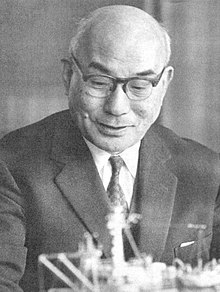Dokō Toshio
Dokō Toshio ( Japanese 土 光 敏夫 ; born September 15, 1896 in Ōno (大 野村) in Okayama Prefecture ; died August 4, 1988 ) was a politically active Japanese entrepreneur of the Shōwa period .
life and work
Dōko Toshio graduated from Tōkyō Technical High School (東京 高等 工業 学校, Tōkyō kōtō kōgyō gakkō), today's Tōkyō Kōgyō Daigaku . After completing his training, he joined the shipbuilding company Ishikawajima (東京 石 川島 造船 所, Tōkyō Ishikawajima zōsenjo). While he later headed the Ishikawajima heavy industry (石 川島 重工業, Ishikawajima jūkōgyō), he organized the merger with the shipbuilding company Harima (播 磨 造船 所). In 1960 he became president of the newly formed Ishikawa-Harima Heavy Industries (IHI).
At the request of the President of Keidanren Ishizaka Taizo, he became president of the troubled Toshiba company . In eight years he succeeded in motivating management and employees so that the company made a profit again.
After Dōko himself became president of Keidanren in 1974, he successfully resisted an amendment to the antimonopoly law. He opposed the efforts of the Liberal Democratic Party LDP, which wanted to abuse Keidanren for soliciting party donations. He advocated a temporary ban on political activities by public institutions.
1980 Dōko ended his presidency of the Keidanran. In 1981, at the age of 84, he was asked by Prime Minister Suzuki to chair the 2nd Temporary Council for the Investigation of State Administration ( 第 2 次 臨時 行政 調査 会 Dai-niji rinji gyōsei chōsakai ), whereupon he held meetings across the country Discussion of management improvement hosted. With the catchphrase "No tax increases, financial health", Prime Minister Nakasone was presented with the result, namely to reform the "three public corporations" (English for the so-called 三 公社 sankōsha , "three public companies"): the "Japanese National Railways" ( English for the Japanese State Railways ), the "Nippon Telegraph and Telephone Public Corporation" (English for the 日本 電信 電話 公社 Nippon denshin denwa kōsha ; NTT) and the "Japan Tobacco and Salt Public Corporation" (English for the 日本 専 売公社 Nippon senbai kōsha , "Japanese monopoly company"). This then resulted in the Japan Railways Group , Nippon Telegraph and Telephone Corp. (English for the Nippon denshin denwa KK; NTT) and the Japan Tobacco (English for the Nihon Tabako sangyō ; JT), all under private law as stock corporations (KK, Eng. Ltd./Co."/ua) organized. In 1986 Dōko retired into private life.
Remarks
literature
- S. Noma (Ed.): Dokō Toshio . In: Japan. An Illustrated Encyclopedia. Kodansha, 1993, ISBN 4-06-205938-X , p. 291.
Web links
| personal data | |
|---|---|
| SURNAME | Dokō, Toshio |
| ALTERNATIVE NAMES | 土 光 敏夫 (Japanese) |
| BRIEF DESCRIPTION | Japanese entrepreneur |
| DATE OF BIRTH | September 15, 1896 |
| PLACE OF BIRTH | Ono ( Okayama Prefecture ) |
| DATE OF DEATH | 4th August 1988 |
